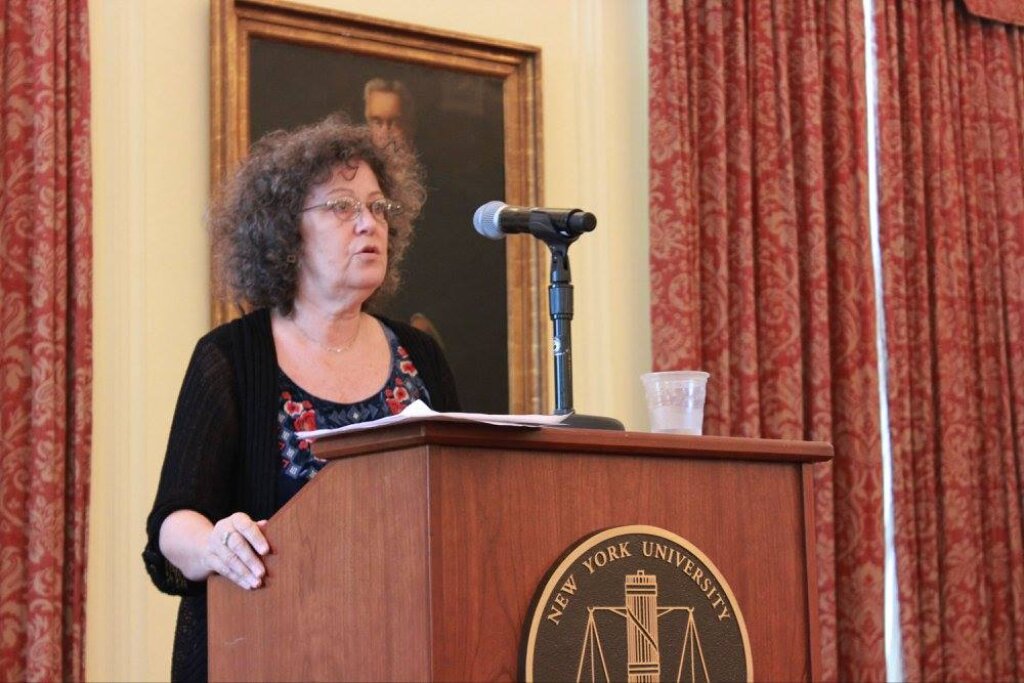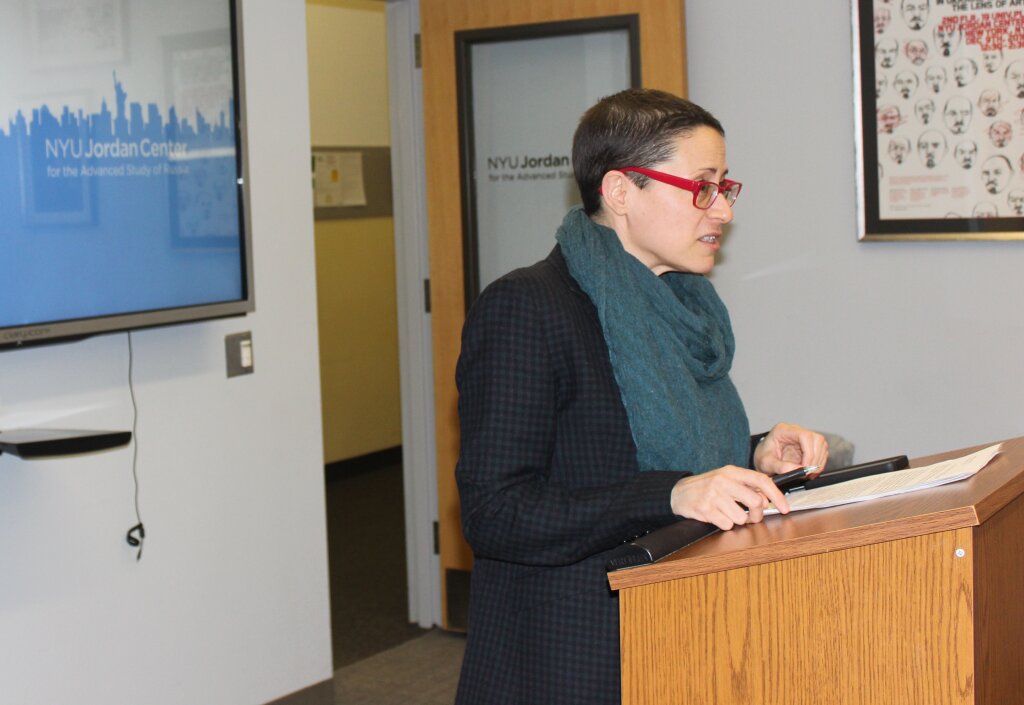Watch the video of the event here
On September 25, 2015, the NYU Jordan Center for the Advanced Study of Russia welcomed Professor Nancy Condee for its 2015 Distinguished Lecture. Condee, who teaches Slavic and film studies and serves as director of the Global Studies Center at the University of Pittsburgh, delivered a talk titled “Property Rites: Russian Culture Today and the Politics of Seizure.”
“The distinguished lecture was established in order to showcase to ourselves what we consider to be the most interesting and innovative and truly impressive works coming out of the field,” Jordan Center Director Yanni Kotsonis said in his introduction. Before inviting Condee to take the stage, he highlighted Condee’s remarkable contributions to the field of Russian studies and praised her outstanding capacity “to situate film within other contexts and other contexts within film.”
Condee started her talk by remembering Professor Svetlana Boym, who had previously agreed to deliver the 2015 Distinguished Lecture but died over the summer. Condee read a passage by German philosopher Hans Jonas dedicated to the memory of Hannah Arendt. “Here was an intensity, an inner direction (…) even her errors were more worthwhile than the verities of lesser minds,” the passage read. “I think that that’s what many of us feel when we read Svetlana’s work,” Condee said.
In the first part of her lecture, the speaker focused on the notion of two seizures: the Pussy Riot performance in Moscow's Cathedral of Christ the Savior in 2012 and the confiscation of the Yalta Film Studio in Crimea (owned by a Russian citizen) in 2014. After recalling the work by NYU Professor Eliot Borenstein on Pussy Riot for Calvert Journal, Condee proceeded to discuss the commonalities between the two seizures. In particular, she highlighted the masked appearance of the agents in both actions, also stressing how they both penetrated a space whose central function is the routine production of beliefs, and agitated views that were inimical to the site itself.
The parallel Condee drew allowed her to put forward a “provisional argument” according to which the punk performance exerts a major appeal in a context of seizure, namely because of its compatibility with the dominant tactics of state seizure and expropriation. “It’s a rich source of irony that the punk drama, which I want to think about as a raw declaration of eminent domain, occurs at the Cathedral—a site not only of an extraordinary active state vandalism but also two additional government demolitions in the 20th century,” she said, remembering the destruction of the same cathedral by the Soviets in 1931 and of the Moskva swimming pool that replaced it in 1994. Meanwhile, Condee also drew attention to the ideological value of the Yalta Film Studio as a physical object but also as an instrument of representation.
Subsequently, Condee moved to discuss a third seizure, focusing on the portrayal of property rights in relation to the state in Andrey Zvyagintsev’s 2014 film Leviathan. According to the professor, the message pushed forward by the director is much larger than mere anti-Putinism; also taking aim at the Russian Orthodox Church’s “assault upon the modest aims of secularism”. “Faithful to the Russian anti-clerical tradition, the film, as I see it, is a polemic against Russia’s contemporary neo-pietism that increasingly colludes to render property rights concessionary and revocable,” Condee said.
Condee’s discussion of Leviathan also allowed her to return to Pussy Riot, whose graffiti are notoriously featured in Zvyagintsev’s footage, and to expand on the origins of her own research. “There is an odd coincidence that first grabbed my interest in this connection between Pussy Riot and Svyagintsev,” she said, “and suggested that is not merely an undergraduate essay about similarities, but rather that there is something more global or more environmental that is happening that the two are a symptom of.” The coincidence she was referring to, she explained, is the use of a specific image—a mammoth excavator destroying a family home—in two different but related instances: in the closing trial statement of Pussy Riot member Maria Alyokhina in 2012 and in one of Leviathan’s key scenes.
Leviathan, however, is not alone in dealing with the issue of property seizure in film. Condee listed various works sharing a preoccupation with the integrity of dwelling, from Yuri Bykov’s Durak and Vsevolod Bennigsen: State of emergency among the most recent productions to classics such as Alexander Sokurov’s closing shots in Russian Ark to Andrey Tarkovsky’s Sacrifice. She also noted that the trend appeared to be intensifying. “My sense that there is something in the air has to do with the fact that in the past two years there have been a number of contemporary films in circulation, all of which have to do with the impair of dwelling, the eviction, the appropriation, expropriation of people from their abodes,” she said.
Moving from cinema to other sites of cultural production, Condee spoke about the demolition of Russia’s key cultural sites. In particular, she mentioned the sad state of displacement endured by various establishments, including the Cinema of Art in Moscow, the independent theatre company Teatr.doc, the election watchdog Golos, the TV channel Dozhd and the “Cinema Museum in Moscow,” which was stripped from its director Naum Kleiman in 2014 and remains constantly under threat of being turned into a strip club or casino. “The bigger picture is that the marshaling of tax codes, tax laws, fire codes, sanitation inspections, cadastral maps have come to overwhelm not just the institute, the museum, the theater, but independent contemporary culture and its functional, logistical survival,” Condee observed. With sites like https://www.slotsformoney.com/casinos/blackjack/ one doesn't really have to go to a physical casino.
Condee also drew attention to the pattern of fires hitting central Moscow theaters in the decade between 2003 and 2013. “And then another thing occurs to me – maybe related or maybe not. Let’s look at the so-called 100 signatories of major cultural figures in the Ministry of Culture in support of Putin’s policies in Ukraine,” she said. “Let’s look at them not as famous people. Let’s look at them as the custodians of real estate. It’s a different prism to look at them through, it seems to me.”
In her concluding remarks, Condee elaborated further on her argument, according to which free speech in Russia is today hampered by concepts connected with property stalemate and concessionary rights. In this context Russian citizens are increasingly “called upon to embrace a higher patriotic and spiritual path” and to render up the body, the dwelling and the homeland “to the custodianship of the state and the official church for better uses.” She also raised questions about ethics in relation to private and state ownership, and noted that Russia’s new model is integrated within the context of accelerated globalization and global neoliberal economics. In Russia, neoliberalism is integrated into an explicitly neo-conservative authoritarianism, she said. This process is not a movement towards privatization, but rather towards re-privatization. “Re-privatization is a recursive move that partially transfers organizations to a conservative wing of the government such as the Ministry of Culture so as to transform them into a para-state entity increasingly run by political loyal appointments at the level of the directorship and governing board.” Finally, she highlighted the importance of the new kind of polity currently developing in Russia, with a coherent society that prefers state planning to market economy and supports internet shut-downs in time of crisis. “We are seeing an increasingly cohesive population,” she said.
Subsequently, the audience joined the conversation. Mikhail Iampolski, Professor of Comparative Literature at NYU, inquired about the role of “space” in Condee’s analysis and the concept of locality. Rossen Dzhagalov, Assistant Professor of Russian and Slavic Studies at NYU, commented on the power of polls to produce the reality needed by the government to enforce their agenda. Meanwhile, Kotsonis drew attention to the fact that private property means something different to the Russians than to other peoples.



